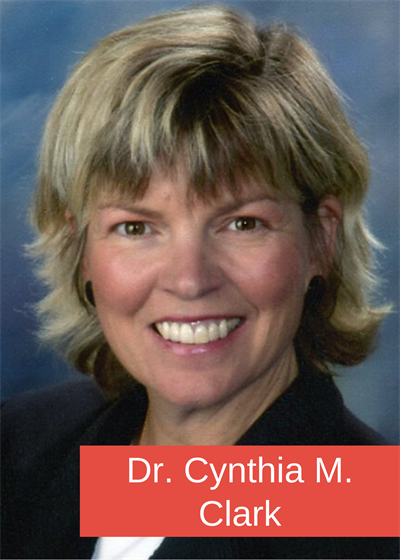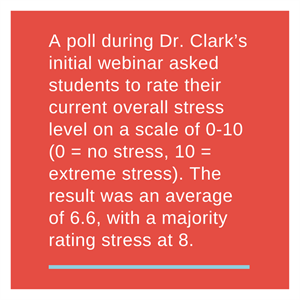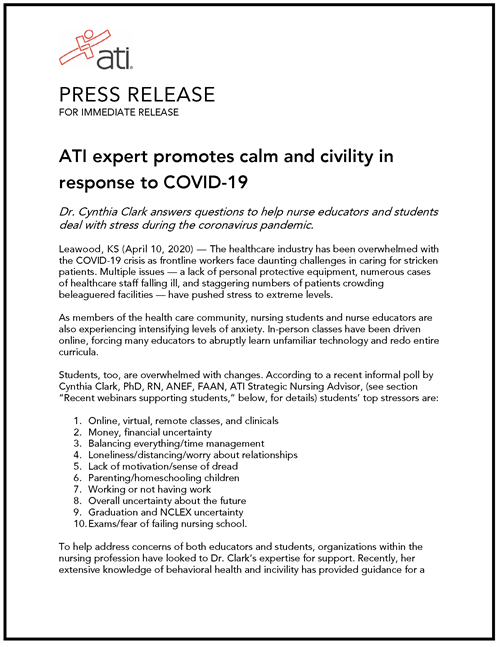
ATI expert promotes calm and civility in response to COVID-19
Dr. Cynthia Clark answers questions to help nurse educators and students deal with stress during the coronavirus pandemic.
 Leawood, KS (April 10, 2020) — The healthcare industry has been overwhelmed with the COVID-19 crisis as frontline workers face daunting challenges in caring for stricken patients. Multiple issues — a lack of personal protective equipment, numerous cases of healthcare staff falling ill, and staggering numbers of patients crowding beleaguered facilities — have pushed stress to extreme levels.
Leawood, KS (April 10, 2020) — The healthcare industry has been overwhelmed with the COVID-19 crisis as frontline workers face daunting challenges in caring for stricken patients. Multiple issues — a lack of personal protective equipment, numerous cases of healthcare staff falling ill, and staggering numbers of patients crowding beleaguered facilities — have pushed stress to extreme levels.
As members of the health care community, nursing students and nurse educators are also experiencing intensifying levels of anxiety. In-person classes have been driven online, forcing many educators to abruptly learn unfamiliar technology and redo entire curricula.
Students, too, are overwhelmed with changes. According to a recent informal poll by Cynthia Clark, PhD, RN, ANEF, FAAN, ATI Strategic Nursing Advisor, (see section “Recent webinars supporting students,” below, for details) students’ top stressors are:
- 1. Online, virtual, remote classes, and clinicals
- 2. Money, financial uncertainty
- 3. Balancing everything/time management
- 4. Loneliness/distancing/worry about relationships
- 5. Lack of motivation/sense of dread
- 6. Parenting/homeschooling children
- 7. Working or not having work
- 8. Overall uncertainty about the future
- 9. Graduation and NCLEX uncertainty
- 10. Exams/fear of failing nursing school.
To help address concerns of both educators and students, organizations within the nursing profession have looked to Dr. Clark’s expertise for support. Recently, her extensive knowledge of behavioral health and incivility has provided guidance for a podcast interview and two webinars for students. It will also be the focus of an upcoming webinar for educators.
Dr. Clark’s expertise comes from years of experience within nursing and nursing education. As a behavioral health nurse, she specialized in adolescent mental health, violence and suicide prevention, and substance abuse treatment and recovery. She serves as a fellow in the American Academy of Nursing, the National League for Nursing Academy of Nursing Education, and co-chaired the American Nurses Association Professional Panel on Incivility, Bullying, and Workplace Violence. Her theory-driven interventions, empirical measurements, theoretical models, and reflective assessments provide best practices to foster civility and healthy work environments around the globe. Dr. Clark is a prolific researcher, innovator, presenter, and author whose presentations number in the hundreds and whose publications have appeared in a broad range of peer-reviewed and open-access venues. Her empirical measures have been translated into 14 languages and used by scholars in more than 30 countries to measure incivility and to foster healthy workplaces.
Here's how her expertise is being shared:
AIDING EDUCATORS IN AACN WEBINAR NEXT WEEK
The American Association of Colleges of Nursing (AACN) has been building a repository of coronavirus resources for nurse educators on its website. As part of this resource, it has been coordinating webinars on COVID-19-related topics since March 13. Topics have ranged from “Making informed decisions in response to COVID-19” to “Public health: Nursing education and the COVID-19 pandemic.”
Next week, April 17, noon-1 p.m. EST, AACN will host a webinar featuring Dr. Clark discussing the topic of “Creating calm and civility during uncertain times.” AACN describes the session as a “timely and thought-provoking dialogue that will discuss ways to create calm, resilience, mindfulness, and civil conversations during times of stress and uncertainty.”
All AACN’s COVID-19-focused sessions are open to the public at no charge. (No CEUs are provided.)
RECENT WEBINARS SUPPORTING STUDENTS
 Since universities and colleges closed campuses to in-person classes and moved all courses online, students have struggled with multiple concerns. From the threat of potential illness, the need for physical distancing, and the effort to cope with unforeseen circumstances, they also have been trying to balance the competing demands of friends and family with school and work responsibilities. The result has taken a significant toll on the overall health and well-being of many.
Since universities and colleges closed campuses to in-person classes and moved all courses online, students have struggled with multiple concerns. From the threat of potential illness, the need for physical distancing, and the effort to cope with unforeseen circumstances, they also have been trying to balance the competing demands of friends and family with school and work responsibilities. The result has taken a significant toll on the overall health and well-being of many.
Seeing the need to provide support, Dr. Clark went live in a two-part webinar series recently on “Conversations on stress, coping, and wellness in uncertain times.” The 30-minute webinars — on March 27 and April 3, now available via recordings — discussed:
- • Signs and symptoms of stress
- • Setting priorities to mitigate stress in uncertain times
- • Coping during the COVID-19 pandemic
- • Wellness activities
- • Resources to implement during uncertain times.
During the first webinar, Dr. Clark asked students to share their top stressors. She revealed the list (referenced at the beginning of this communication) in her second session, which built on the initial discussion and offered new information.
More than 400 students from across the United States — from smaller institutions such as North Central Kansas Technical College (Beloit, Kan.) and Cape Coral (Fla.) Technical College to major universities such as the University of Texas at Arlington, California State University at Los Angeles, and Florida Atlantic University (Boca Raton, Fla.) — attended the webinars.
A poll during Dr. Clark’s initial webinar asked students to rate their current overall stress level on a scale of 0-10 (0 = no stress, 10 = extreme stress). The result was an average of 6.6, with a majority rating stress at 8.
Later in the session, after offering advice on coping and asking students to chat in the activities they’ve been using, she asked attendees to rate their stress after they participated in those efforts. Students’ ratings, after analysis, averaged 4.1.
“That is pretty significant,” Dr. Clark noted, adding the drop was about 25 percent. “It’s very consistent with other research studies that I’ve done on student stress and coping where we do see an amazingly significant drop in overall stress levels after participating in healthy coping and self-care activities.”
Dr. Clark and ATI are considering additional opportunities to help students in the future.
PODCAST INTERVIEW FOR NURSING JOURNAL ‘NURSE EDUCATOR’

Stress was also a topic of an April 6 Nurse Educator podcast: “Civility Mentor: Virtual learning experience for nursing students.” Richard L. Pullen Jr., EdD, RN, CMSRN, Professor of Nursing at Texas Tech University Health Sciences Center School of Nursing (Lubbock, Texas) and a member of the journal’s editorial board, talked with Dr. Clark regarding how conversations about civility can help faculty and students cope with stress. The discussion touched on the ATI product Dr. Clark helped develop that was based on her research in the area of civility. That product, Civility Mentor, is a virtual learning experience that faculty can use to promote civility among faculty and students and help prepare students to communicate, collaborate, and establish professional relationships in the practice environment when students graduate.
The podcast episode followed up on the publication of an article that Dr. Clark cowrote with Michelle Dunham, PhD, “Civility Mentor: A virtual learning experience,” released last November. The article is available via open access on the Nurse Educator website.
The article focused on how incivility and disrespect in healthcare weaken teamwork and collaboration, diminish communication, and can impact an individual's ability and willingness to speak up and advocate for patient care. These issues are crucial at any time, but they have become especially important during the COVID-19 pandemic.
“I know that many of us are feeling overwhelmed right now. But we are in this together,” Dr. Clark said. “We can do this. We’ve got each other’s back and, collectively, as nurses, we will make it happen. While this pandemic was definitely not in our plan, we are problem-solving together and developing and implementing new ‘best practices’ that will revolutionize nursing education.”
# # # # #

About ATI
ATI is the leading provider of online learning programs for improving faculty effectiveness and student and program outcomes in nursing schools across the country. ATI maintains a 97 percent client-retention rate based on providing consistently reliable delivery of high-quality assessment, remediation, and educational products. Currently, ATI Nursing Education works with 20,000+ nurse educators, about 2,700 colleges and universities, and more than 500,000 students, plus more than 1.3 million graduates. The business began in 1998 with the help of a nurse. Today, nurses remain a valued part of its staff, with a team of 230 nurse educators, as well as nearly a dozen psychometric professionals who specialize in educational products, test development, and statistical methods.
Leave a comment